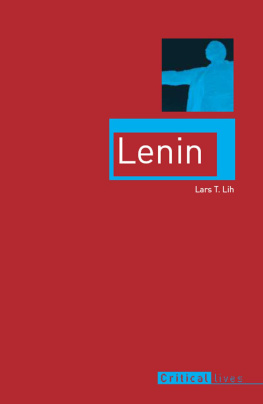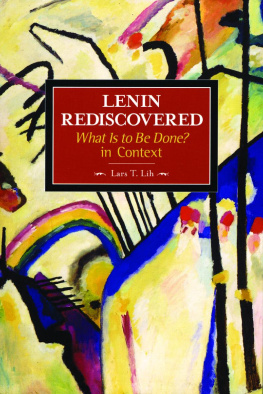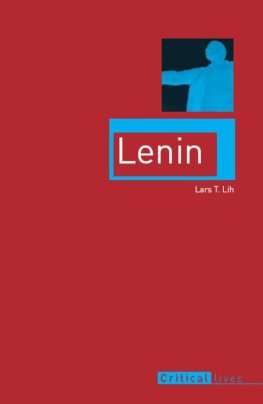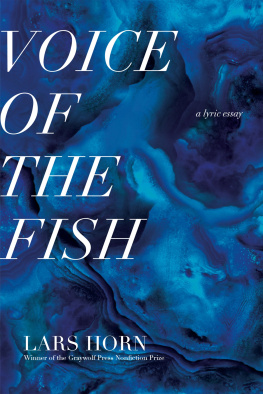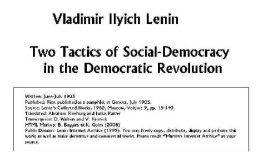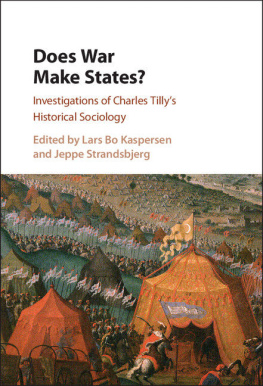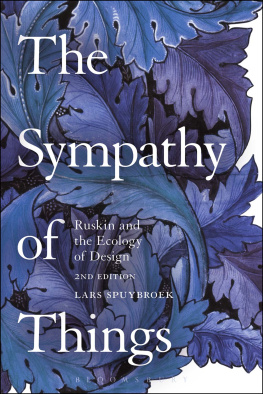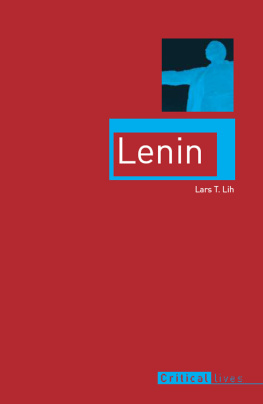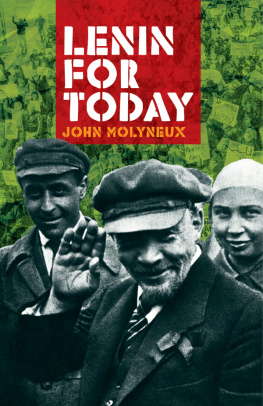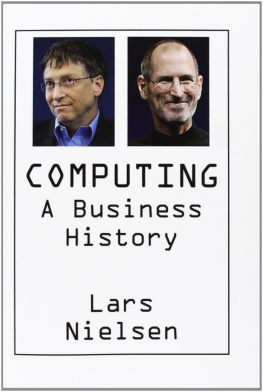Lars T. Lih - Lenin
Here you can read online Lars T. Lih - Lenin full text of the book (entire story) in english for free. Download pdf and epub, get meaning, cover and reviews about this ebook. year: 2011, publisher: Reaktion Books, genre: Politics. Description of the work, (preface) as well as reviews are available. Best literature library LitArk.com created for fans of good reading and offers a wide selection of genres:
Romance novel
Science fiction
Adventure
Detective
Science
History
Home and family
Prose
Art
Politics
Computer
Non-fiction
Religion
Business
Children
Humor
Choose a favorite category and find really read worthwhile books. Enjoy immersion in the world of imagination, feel the emotions of the characters or learn something new for yourself, make an fascinating discovery.
- Book:Lenin
- Author:
- Publisher:Reaktion Books
- Genre:
- Year:2011
- Rating:3 / 5
- Favourites:Add to favourites
- Your mark:
- 60
- 1
- 2
- 3
- 4
- 5
Lenin: summary, description and annotation
We offer to read an annotation, description, summary or preface (depends on what the author of the book "Lenin" wrote himself). If you haven't found the necessary information about the book — write in the comments, we will try to find it.
Lenin — read online for free the complete book (whole text) full work
Below is the text of the book, divided by pages. System saving the place of the last page read, allows you to conveniently read the book "Lenin" online for free, without having to search again every time where you left off. Put a bookmark, and you can go to the page where you finished reading at any time.
Font size:
Interval:
Bookmark:

Lenin

Titles in the series Critical Lives present the work of leading cultural figures of the modern period. Each book explores the life of the artist, writer, philosopher or architect in question and relates it to their major works.
In the same series
Jean Genet | Erik Satie | Gertrude Stein |
Michel Foucault | Georges Bataille | Pablo Neruda |
Pablo Picasso | Ludwig Wittgenstein | Samuel Beckett |
Franz Kafka | Octavio Paz | William S. Burroughs |
Guy Debord | Walter Benjamin | Stphane Mallarm |
Marcel Duchamp | Charles Baudelaire | Vladimir Nabokov |
James Joyce | Jean Cocteau | Alfred Jarry |
Frank Lloyd Wright | Sergei Eisenstein | Claude Debussy |
Jean-Paul Sartre | Salvador Dal | Simone Weil |
Noam Chomsky | Simone de Beauvoir | |
Jorge Luis Borges | Edgar Allan Poe |
Lenin
Lars T. Lih
REAKTION BOOKS
Published by Reaktion Books Ltd
33 Great Sutton Street
London EC V DX , UK
www.reaktionbooks.co.uk
First published 2011
Copyright Lars T. Lih 2011
All rights reserved
No part of this publication may be reproduced, stored in a retrieval system, or transmitted, in any form or by any means, electronic, mechanical, photocopying, recording or otherwise, without the prior permission of the publishers.
Page references in the Photo Acknowledgements and
Index match the printed edition of this book.
Printed and bound in Great Britain
by CPI /Antony Rowe, Chippenham, Wiltshire
British Library Cataloguing in Publication Data
Lih, Lars T.

Lenin, faced with new technology for spreading the word, seems somewhat nonplussed (March 1919).
IntroductionOn the shelves of my study, in serried ranks of blue, stand the 55 volumes of the fifth edition of the works of V. I. Lenin. In their way, these volumes equipped with a fantastically elaborate scholarly apparatus detailing every name, book and even every proverb mentioned by their author are the building blocks of an intellectual mausoleum comparable to the corporeal mausoleum that still stands in Moscow. Just as impressive an accomplishment of what might be called embalming scholarship is the multivolume Vladimir Ilich Lenin: Biograficheskaia Khronika , consisting of over 8,000 pages detailing exactly what Lenin did on every day for which we have information (usually he was writing an article, issuing an intra-party protest, making a speech).
And yet the very title of this biokhronika points to a biographical puzzle, since the name Vladimir Ilich Lenin is a posthumous creation. The living man went by many names, but Vladimir Ilich Lenin was not among them. Posteritys need to refer to this man with a name he did not use during his lifetime gives us a sense of the difficulty of capturing the essence of this passionately impersonal figure without mummifying him, either as saint or as bogeyman.
What should we call him? He was christened, shortly after his birth in 1870, as Vladimir Ilich Ulyanov. Ilich is a patronymic, meaning son of Ilya. And yet, for many during his lifetime and after, Ilich conveyed a greater sense of the individuality of the man than Vladimir. As soon as he started on his revolutionary career in the early 1890s the exigencies of the underground led our hero to distance himself from his given name. The surviving copy of his first major written production Who are these Friends of the People and How Do They Fight against the Social Democrats? (1893) has no authorial name on the title-page. In works legally published in the 1890s our hero adopted more than one new name: K. Tulin or (for his magnum opus of 1899, The Development of Capitalism in Russia ) Vladimir Ilin, a pseudonym that hardly hides his real name. Right up to the 1917 revolution, legally published works by Vl. Ilin continued to appear.
Even in a legally published newspaper an underground revolutionary had to exercise care so that his identity would not serve as an excuse to fine it or shut it down. One such paper was the Bolshevik Pravda , published in Petersburg from 1912 to 1914. A close colleague of Lenin, Lev Kamenev, later recalled that in order not to compromise this newspaper Ilich changed the signature to his articles almost every day. In Pravda his articles were signed with the most diversified combinations of letters, having nothing in common with his usual literary signature, such as P.P., F.L.-ko., V.F., R.S., etc., etc. This necessity of constantly changing his signature was still another obstacle between the words of Ilich and his readers the working masses.
Our hero acquired his usual literary signature around 1901, while serving as one of the editors of the underground newspaper Iskra , when he began to sign his published work as N. Lenin. Why Lenin? We have already seen a certain fondness for pseudonyms ending in -in . But Lenin seems to have been the name of an actual person whose passport helped our man leave Russia in 1900. This passport was made available to Lenin, at second or third hand, as a family favour; in the end, he did not have to use it.
N. Lenin, not V. I. Lenin. His published works, right to the end, have N. Lenin on the title-page. What does the N stand for? Nothing. Revolutionary pseudonyms very often included meaningless initials. But when N. Lenin became world famous, the idea got about that N stood for Nikolai an evocative name indeed, combining Nikolai the Last (the tsar replaced by Lenin), Niccol Machiavelli and Old Nick. In 1919 one of the first more-or-less accurate biographical sketches in English proclaimed its subject to be Nikolai Lenin. President Ronald Reagan was still talking about Nikolai Lenin in the 1980s and perhaps this name is just as legitimate historically as V. I. Lenin.
Title-page of What Is to Be Done? (1902), one of the first publications bearing the name N. Lenin. |
|
In any event, Lenin never used Vladimir Ilich Lenin as a signature. Most of his letters are simply signed Yours, Lenin or the like. Certainly Lenin did not bother to hide his real name. In a 1908 letter to Maxim Gorky signed Yours, N. Lenin, he gives his Geneva address: Mr. Wl. Oulianoff. 17. Rue des deux Ponts. 17 (chez Kpfer). Only in letters to his family and to Inessa Armand does he usually forego his usual literary signature and sign off as V. U. or V. I.
Next pageFont size:
Interval:
Bookmark:
Similar books «Lenin»
Look at similar books to Lenin. We have selected literature similar in name and meaning in the hope of providing readers with more options to find new, interesting, not yet read works.
Discussion, reviews of the book Lenin and just readers' own opinions. Leave your comments, write what you think about the work, its meaning or the main characters. Specify what exactly you liked and what you didn't like, and why you think so.

